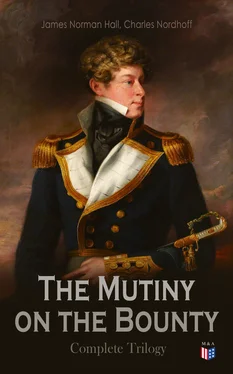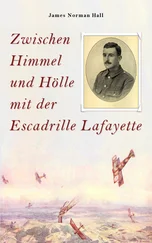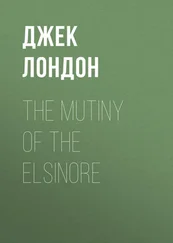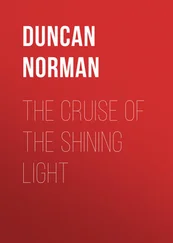Hitihiti told me that Moana, Hayward’s taio, was so incensed at the prospect of seeing the midshipman flogged that he had gone aboard that morning with a loaded pistol concealed under his cloak, planning to shoot Mr. Bligh through the heart before the first stroke of the cat could be delivered. Seeing his taio escape a flogging, but sent below to be confined, Moana conceived the idea of releasing his friend by wrecking the ship. He sent one of his henchmen to sever the cable under cover of night, and had the man performed his task properly the ship would infallibly have been lost.
I reflected for some time on Hitihiti’s words, and finally, considering the incident closed and knowing that the cables were now watched with extra care throughout the night, I came to the conclusion that it was not necessary to inform Mr. Bligh of what I had learned. To tell him would only have increased his harshness to Hayward, and caused trouble with Moana, a powerful chief.
Toward the end of March it became evident to all hands that the Bounty would soon set sail. More than a thousand young breadfruit trees, in pots and tubs, had been taken on board, and the great cabin aft resembled a botanical garden with the young plants standing thick in their racks, all in a most flourishing condition, their foliage of the richest dark green. Great quantities of pork had been salted down, under the captain’s direction, and a large sea store of yams laid in. Only Mr. Bligh knew when we would sail, but it was clear that the day of departure could not be far off.
I confess that I felt no eagerness to leave Tahiti. No man could have lived with so kind a host as Hitihiti without becoming deeply attached to the old man and his family, and my work on the Indian language interested me more each day. I was now able to carry on ordinary conversations with some fluency, though I knew enough to realize that a real mastery of this complex tongue would require years. The vocabulary I had planned was now complete and had been many times revised as I perceived mistakes, and I had made good progress on the grammar. Leading a life of the most delightful ease and tranquillity, and engaged on a congenial task in which I felt that I was making some headway, it is not to be wondered at that for days at a time I scarcely gave England a thought. Had it not been for my mother, I believe that I might have been content to settle down to a long period of the Indian life, and had I been assured that another vessel would touch at Tahiti within six months or a year, I should certainly have asked Mr. Bligh’s permission to stop over and complete my work.
Christian, whom I had grown to know well, disliked the thought of departure as much as I. His attachment to Maimiti was of the tenderest description, and I knew how he must dread the final parting from her. Of the midshipmen, Stewart was as deeply attached to his Indian sweetheart as Christian himself. Young was constantly in the company of a girl called Taurua, the Indian name for the evening star. Stewart called his sweetheart Peggy; she was the daughter of a chief of some consequence on the north end of the island, and devotedly attached to him.
A day or two before the Bounty sailed, Christian, Young, and Stewart strolled up the beach to call on me, accompanied by Alexander Smith, my hammock man. Smith had formed an alliance with a short, dark, lively girl of the lower orders, who loved him in the robust fashion of a sailor’s lass. He called her Bal’hadi, which was as close as his honest English tongue could twist itself to Paraha Iti, her true name.
We had been so long in Tahiti, and my shipmates had been so constantly in the company of the natives, that many of them were able to make themselves understood to some extent in the Indian language. Both Stewart and Ellison spoke it remarkably well, and Young and Smith had likewise made considerable progress in it. Smith, nevertheless, was of the opinion that, if English were spoken slowly and in a loud voice, it must be a stupid foreigner indeed who could fail to understand.
As my visitors from the Bounty approached the house I knew instinctively that Christian had news for me, but he had been so much among the Indians that he had acquired some notion of their ceremonial ideas of politeness, which demand a decent interval of light conversation before any important announcement is made.
Maimiti greeted her lover affectionately, and old Hitihiti had mats spread for us in the shade and ordered drinking coconuts to be fetched. My host had asked me, as a last favour, to have made for him a model of the Bounty’s launch, which he admired greatly. He believed that with the aid of this model his native shipwrights would be able to build a boat, since I had explained to him the process of warping a plank. I had entrusted the model making to Smith, who had completed the task in less than a week, with every dimension true to scale. He walked behind the others, followed by Bal’hadi, who carried the model on her shoulder. Hitihiti’s face lit up at sight of it.
“Now I shall start my boat,” he said to me in the native tongue. “You have kept your word and I am well content!”
“Let him remember,” said Smith, “a foot to the inch and he can’t go wrong, I’ll warrant!”
He handed the model to Hitihiti, who took it with every sign of pleasure and gave me an order to one of his servants, who soon appeared leading a pair of fine hogs.
“They are for you, Smith,” I explained, but my hammock man shook his head regretfully.
“No use, sir,” he said. “Mr. Bligh won’t let us keep the pigs our taios send on board. But if the old chief would give me a sucking pig, me and my lass could cook and eat it in no time.” He smacked his lips and gave me a hopeful glance.
Hitihiti smiled with pleasure at the request and directed that Smith should go with one of the Indians to pick out the pig that pleased him best. A few minutes later the seaman passed us, his sweetheart at his side and a squealing young porker under his arm. They disappeared into a thicket near the beach, and presently we heard louder squeals, followed by silence, and saw a column of smoke rising above the trees. I have a fancy that the Indian law which prohibited women from dining with men was broken that day.
Reclining in the shade and drinking the sweet milk of young coconuts, we had been gossiping idly with the girls, and presently Christian glanced up and caught my eye.
“I have news for you, Byam,” he said. “We are to set sail on Saturday. Mr. Bligh bids you come on board on Friday night.”
As if she understood the words, Maimiti looked at me sorrowfully, took her lover’s hand and held it tight. “Bad news for me, at any rate,” Christian went on. “I have been very happy here.”
“And for me,” put in Stewart, with a glance at his Peggy.
Young yawned. “I’m not sentimental,” he remarked. “Taurua here will soon find another fancy man.” The lively brown-eyed girl at his side understood his words perfectly. She tossed her head in denial and gave him a playful slap on the cheek. Christian smiled.
“Young is right,” he said; “when the true seaman leaves one sweetheart he is already looking forward to the next! But I find it hard to practise what I preach!”
Toward evening our guests left us to return to the ship, and I was forced to follow them the next day. I took leave of Hitihiti and his household with sincere regret, fully convinced that I should never see any one of them again.
I found the Bounty crowded with Indians, and loaded with coconuts, plantains, hogs, and goats. The great chief Teina and his wife were the captain’s guests and slept on the ship that night. At daybreak we worked out through the narrow Toaroa passage, and stood off and on all day, while Bligh took leave of Teina and made up his parting gifts to the chief. Just before sunset the launch was sent ashore with Teina and Itea, while we manned the ship with all hands and gave them three hearty cheers. An hour later the helm was put up and the Bounty stood off shore with all sail set.
Читать дальше











